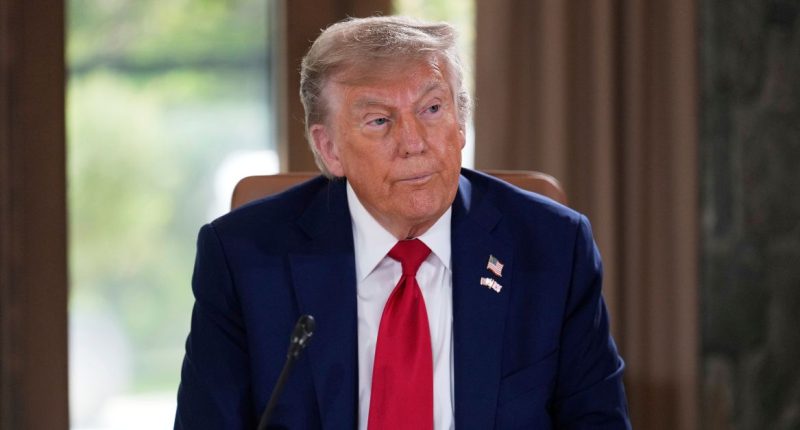Share this @internewscast.com
President Donald Trump participates in a session of the G7 Summit, Monday, June 16, 2025, in Kananaskis, Canada (AP Photo/Mark Schiefelbein).
On Thursday, a federal judge widened the reach of an injunction regarding one of President Donald Trump’s executive orders aimed at a Big Law firm, upon the firm’s own request.
The ruling puts the kibosh on a squabble between the law firm and the government over the reach of the court’s earlier nullification.
On March 27, the 45th and 47th president signed an Executive Order titled “Addressing Risks from WilmerHale.” This order, similar to many others, accused the Los Angeles-based Wilmer Cutler Pickering Hale and Dorr LLP, known as WilmerHale, of engaging in “conduct detrimental to critical American interests,” and intended to exclude its employees from federal government positions.
On March 26, WilmerHale submitted a 64-page complaint. The government subsequently sought to have the lawsuit dismissed, leading to a legal confrontation over motions for summary judgment.
On May 27, Senior U.S. District Judge Richard J. Leon, a George W. Bush appointee, issued an emphatic ruling for the plaintiffs in the form of a 73-page memorandum opinion featuring no fewer than 27 exclamation points — used to express disdain for what the court views as the severity of the constitutional violations in Trump’s order. In volubly chiding language, the judge termed the attack on WilmerHale “null and void” for violating the U.S. Constitution.
Love true crime? Sign up for our newsletter, The Law&Crime Docket, to get the latest real-life crime stories delivered right to your inbox.
Earlier this month, in a six-page motion to amend the judgment, the law firm said its lawsuit was fashioned in such a way so as to explicitly encompass the entire federal government.
The court, however, initially cabined the reach of its injunction.
“WilmerHale named only 51 federal agencies and officers in its Complaint, and the Court thus issued injunctive relief only as to those agencies and officers,” Leon explained in a 6-page memorandum order issued this week.
Now, the court has clarified its order to apply to the entirety of the federal government, writ large and full stop.
“The Court finds that amending its Order is necessary to prevent manifest injustice,” the order goes on. “WilmerHale is concerned that even though the Court declared the WilmerHale Order unconstitutional, it ‘will nevertheless be enforced against it by agencies and officers who may not be aware (or could potentially claim unawareness) of either this Court’s declaratory judgment or their obligation to comply with that declaration.’The Court struck down the WilmerHale Order in its entirety and declared it null and void.”
In their motion to clarify filed June 10, the law firm explained that the Trump administration refused to directly notify several agencies about the nullification order – despite repeat emails from WilmerHale’s counsel.
In other words, the law firm sued several dozen named agencies — and the United States broadly — in the hope that it would be clear and understood they were suing the entirety of the federal government covered by Trump’s order. But after the dust settled, the Trump administration claimed the lawsuit — and concomitant injunction — only covered the enumerated agencies listed at the outset.
Leon rubbished this state of affairs.
“This declaratory relief runs as to the United States as a whole, yet according to WilmerHale, defense counsel has refused to notify all United States agencies and officers of this judgment,” the order continues. “Thus the Court must amend its Order to ensure that no federal agencies or officers are misguidedly enforcing the null and void WilmerHale Order.”
The court’s brief order concludes by telling the Trump administration they simply have nothing to complain about here:
None of the defendants can claim prejudice from this amendment and defendants point to no such prejudice. The Court has already declared the WilmerHale Order unconstitutional, and “thus defendants do not have a legitimate interest in enforcing [it].” In fact, since the Court issued declaratory relief as to the United States as a whole, none of the federal agencies and officers should be enforcing the WilmerHale Order anyway.
















